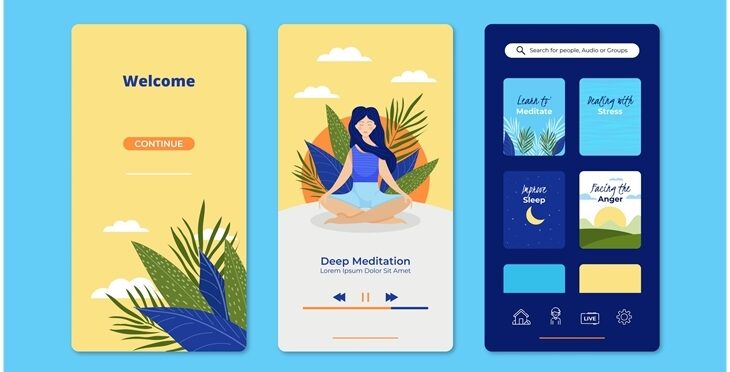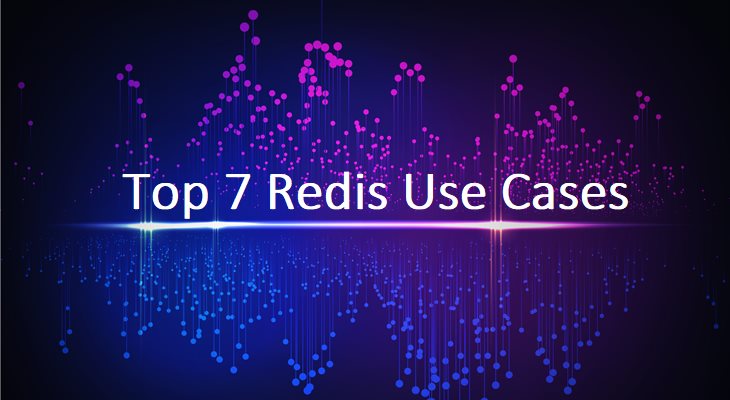Introduction to AI Meditation Apps
The Covid Pandemic has given a boost to AI Meditation Apps. Being stuck inside one's house, especially in the last year and a half, was stressful. It has resulted in an increase in the number of people seeking virtual wellness services. As a result, the wellness industry will grow even more in the coming four years. The whole healthcare industry is being transformed by machine learning and artificial intelligence.
How do AI Meditation Apps Leverage AI
- Taking Advantage of Data in Real-Time
Often, data is ingested, transformed into the desired format. It is saved and then left idle until machine learning engineers and analytics teams need it. But, to make real-time decisions, user data also need access as soon as possible. The developer team has to reduce the end-to-end feedback loop to ensure this. Within seconds or minutes, user actions are analyzed. This also helps to generate relevant, personalized, and context-specific recommendations.
The machine learning model includes features that update throughout the day. These include during each user's sessions.
The majority of these features aim at:
For user search terms, semantic embeddings are used. In other words, if a user searches for "exam preparation," the model recommends meditations focused on that topic.
Individual users' biometric data, such as step count and pulse, gets recorded. It also aids the model in providing personalized exercise content.
- Tech Stack
The model breaks down the structure into publishing, receiver, orchestration, and serving layers. The developers can then develop a solution that caters to the individual needs of the users.
Lightweight Lambda functions used in these apps help to pack and unpack data in appropriate formats. Also, it helps to perform post-processing and persistence.
Advantages Of AI Meditation Apps
Lower Stress
Regular use of meditation apps can provide stress intervention in a pressure-filled situation. Using a smartphone meditation app lowers cortisol levels and systolic blood pressure. But, there is a catch: you must also practice acceptance. This entails being open to and accepting of the way things are.
Researchers used an app to test 144 stressed adults. Some were taught to track the present moment only. While others were taught to track the present moment with acceptance. The participants were placed in a stressful situation. The researchers measured their cortisol levels and blood pressure after completing one 20-minute meditation lesson per day for two weeks.
Cortisol and systolic blood pressure reactivity were lower in those who used the monitoring and acceptance program.
Better Social Relationships
Smartphone-based mindfulness training can also reduce feelings of loneliness. It can encourage people to engage in more social interaction. You must use them in conjunction with acceptance training once again. Participants in this study learned to respond to unpleasant experiences. They had to respond by saying "yes" in a gentle tone of voice while also keeping an open mind.
After two weeks of smartphone-based mindfulness training, they had reduced daily loneliness. They also increased social contact by an average of two interactions per day.
Memory Improvement
It's difficult to focus with so much information bombarding you throughout the day. It's also difficult to remember what you've learned. A meditation app might be able to help. Mindfulness research tested two groups. They gave one group a mediation app. The other group got a foreign language, tai chi, or a logic game app. Each group spent 20 minutes a day using the app.
Participants were also tested on their memory after six weeks. Participants who used the meditation app performed better on working memory tests. The researchers also discovered evidence of changes in brain functions that aided memory improvement.
The advantages of mindfulness training get discovered every day. If 20-minute sessions are too long for you, experts recommend starting small and increasing your time. Mindfulness is similar to exercising a muscle; the more you do it, the stronger you become.
List of AI Meditation Apps
Aura
This mindfulness app gives the user three-minute daily micro-meditations. Aura is an advanced, simple, and effective meditation platform. It also helps users relieve stress and anxiety. AI helps in the personalization of the app. The creation of the app involved some of the best and most sought-after meditation teachers and therapists.
Users of Aura can keep a gratitude journal. They can also track their moods throughout the day, and listen to nature sounds. It even turns meditation into a game. It allows you to progress through levels as you learn and complete daily challenges. If you only have a few minutes throughout the day to meditate, this may be the app for you.
Breethe
Breathe is a free app that tracks users' breathing patterns throughout the day. It tracks data from when they wake up to when they go to sleep. This gives them tools and advice to stick to their meditation routines throughout the day. It also includes five-minute meditations. Also, it gives advice on how to deal with stress, love yourself and live a life of purpose and inner peace.
It's completely customizable, making it an easy-to-use tool for supporting your practice. This app also includes a new feature that puts all the app's content at the user's fingertips. Thus allowing them to create favorites, explore new or popular features. It also gives relevant recommendations.
Buddhify
Meditation sessions follow a theme according to where you are in your day. Buddhify is also widely regarded as one of the best anxiety apps. Buddhify tailors to your needs, whether you're waking up, commuting, or taking a quick break at work. It also helps in dealing with stress or having trouble sleeping.
It comes with over 80 custom meditations created by experts in the field. Buddhify is ideal for people who are on the move in the modern workplace.
Calm
This app brings joy, peace, and clarity to the user's daily life. Users agree that this app is beneficial for meditation, mindfulness, and positive life change. Calm plays the soothing sound of rain in the background. The user can also select from a crackling fireplace, crickets, or celestial white noise.
Headspace
Headspace offers spoken-word exercises designed for around 10-minute sessions per day. It starts with a free 10-session pack with the initial download. It includes short meditations for people on the go as well as SOS meditations for when you're in a crisis. One of the best aspects of this app is that it allows you to try it out before purchasing it. It also teaches users to incorporate meditation into their daily lives in a beneficial way.
Headspace advertises itself as a mental gym membership. Users say that using the app increased attention span, equanimity, alertness, and the ability to deal with stress in everyday life. Even after trying prescription drugs, one user claimed that this app helped him overcome his anxiety.
When you combine noise-canceling headphones with this app, you get an intimate experience. It feels like someone is sitting next to you, directing your movements.
Each session begins with a "checking-in" routine. It allows the user to settle in and prepare for meditation. The user also becomes aware of various physical sensations surrounding them. Such as their body weight and the sensation of their chair or clothes touching their skin after taking some deep breaths. After that, the focus shifts to the breath, all the while counting each inhalation.
Meditation Studio
Meditation Studio's main draw is its diverse selection of meditation courses. The meditation course covers the teachings of a curated roster of meditation instructors. Users can also choose from more than 200 meditations. These are led by various teachers with a variety of professional backgrounds.
Conclusion
The advantages of meditation are many and varied. Also, science backs them up. Many people begin meditating to manage stress, anxiety and cultivate mental peace. Thousands of studies have documented other, lesser-known mindfulness meditation benefits, which can improve mental, physical, and emotional health.
With the evolving tech and refinements in AI, meditation apps are going to be more effective. The above-compiled apps are some of the best in the field. With future refinements in AI and ML, it would be rather fun and useful to use meditations apps.






